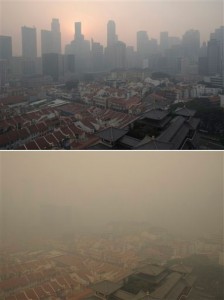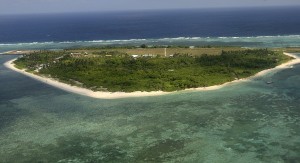
In this combination photo, Singapore’s Central Business District, or CBD, is seen on Thursday with unhealthy levels of haze, top, and at hazardous levels where the CBD is no longer visible on Friday, bottom. AP
MANILA, Philippines—For one Filipino, living amid the haze that has blanketed Singapore for several days now is like standing beside a barbecue grill all day. Only the smoke is everywhere, does not smell as good, and there is virtually nowhere to go.
“This haze is really extreme. I never imagined I would experience this. It’s like a movie, an end-of-the world feeling. You have nowhere to go and you feel like you’re suffocating but you can’t do anything,” said the Filipino, a software consultant who asked not to be named to protect her employment.
Living in the city-state for five years now, the Filipino said she heard of two friends who decided to return to the Philippines for the meantime as “they can’t take it anymore.”
“You can smell it more now. Parang yun siga sa umaga (It’s like a bonfire in the morning). But here it’s all over the country. Amoy siga ang buong Singapore (All of Singapore smells like a bonfire),” she said.
The Philippine Embassy in the city-state on Friday issued a health advisory for Filipinos as the haze topped Singapore’s pollution standards index (PSI) at 401, the worst in its history according to reports.
The smoke began enveloping one of Asia’s smallest, cleanest and most pollution-conscious countries last week, blowing in from nearby Sumatra, Indonesia, where forest fires have been raging for weeks, started by slash and burn farmers.
Singapore authorities have been urging those vulnerable— the elderly, pregnant women, children and those with heart and lung problems—to avoid going outdoors. Doctors have reported a 20-percent spike in medical consultations.
Expected to remain for weeks as Indonesian authorities struggle to put out the Sumatra fires, the haze has become an irritant in the diplomatic ties between Singapore and Indonesia.
The embassy advisory urged Filipinos to “stay indoors, use air-conditioning and air filters if available.” Filipinos were also told to wear masks both at home and outside.
“Drink lots of liquids. Minimize physical exertion outdoors. Take medicine if you have a medical condition and vitamins to boost the immune system,” the embassy advised.


